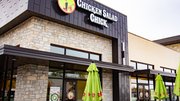Article
Rocking the food chain ladder: 27 female restaurant execs tell all
In part 1 of this series, we interviewed 14 women about what it takes to be a leader in the fast casual industry. Part 2 features 13 more interviews.

March 12, 2019 by Cherryh Cansler — Editor, FastCasual.com
In honor of International Women's Day, March 8, and Women's History Month, Fast Casual interviewed 27 females executives leading the limited-service industry. Part 1 featured 14 interviews. This installment includes 13 more, including interviews with:
- Dawn Nielsen, COO, Kolache Factory.
- Vanessa Duffy, digital marketing manager, Dog Haus.
- Christina Bourg, SVP of Marketing, Rotolo's Pizzeria & Rotolo's Craft & Crust.
- Alexandria Atwell , director of Marketing, Salata Salad Kitchen.
- Amanda Powell, director of Operations & Training, Coolgreens.
- Hala Habal, VP of Corporate Communications, Which Wich.
- Robin Gittrich, VP of Human Resources, Toppers Pizza.
- Cheryl Fletcher, SVP of Franchise Development, Tropical Smoothie Cafe.
- Liz Worley, director of Marketing, Teriyaki Madness.
- Joni Hay-Smith, brand manager, Pita Pit.
- Janene Holig, founding chef, Hot Indian.
- Shelley Wolford, SVP of Communications & Strategy, Golden Corral Corporation.
- April Dennis, chief brand officer, Hwy 55 Burgers

What was your first job in the restaurant industry?
My parents, John and Jerri Banks, started the Kolache Factory when I was 8 or 9 years old, so my first job was scrubbing floors at the restaurant. I like to say I literally worked from the ground up. By the time I was a teenager, I was doing the baking and running the register, and then got involved with marketing and sales after I graduated from college.
It's no secret the restaurant industry has been slow to promote females to c-level executive roles, but that seems to be changing. Why do you more women are finally getting these positions?
I think the restaurant industry may finally be catching up and realizing what some other industries have already figured out, namely, that women have an empathy level that men do not always have that can drastically affect the success of a business. Not only can we understand profit and loss sheets and economies of scale, I think we are sometimes more prone than our male counterparts to understand people, their feelings and perspectives. That in turn, allows us to excel at customer service and working with employees. It is well documented that happy employees are more productive employees. I've heard it said that empathy is a woman's superpower, and I have to agree.
If you weren't in the restaurant business, what would you be doing?
That's easy, I would be a veterinarian. I've always loved animals and taking care of them. Right now, I am loving on four dogs, five cats, four horses and 10 chickens. Sometimes they make me crazy, but they also make me very happy.
What have you learned about yourself during your tenure as a restaurant exec?
That I do not know everything and that it is OK to ask for help. Things are constantly changing and rearranging themselves. I've learned to embrace change and not be afraid of it, knowing if things aren't changing, they are probably dying. I've learned the value in surrounding myself with smart people with different strengths and expertise that can keep us on top of the game.
What is one thing you wish you would have known when you first started your career?
The one thing I wish I would have known when I first started was not to be scared of failure. You will mess up, it's inevitable. You will get things wrong even though you had the right intentions. The key of course, is to learn from your mistakes and move on. When I was young, I spent way too much time worrying about what others thought, which never helped and just wasted time and energy. I would go back and tell myself, 'Be kind to yourself. Focus on what you can control and do not worry about the rest.'
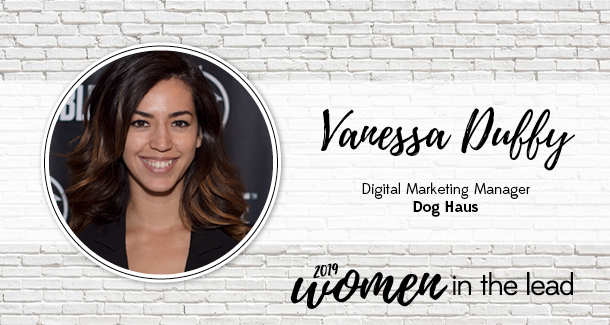
What was your first job in the restaurant industry?
My first job in the restaurant industry was in 2009 at Tokyo Delve's Sushi Bar in North Hollywood, CA. It's a fast-paced, high-energy sushi bar with live entertainment every weekend. I managed the reservations, social media and hosted guests on weekends. I learned pretty quickly how to handle on the spot changes while providing excellent customer service!
It's no secret the restaurant industry has been slow to promote females to c-level executive roles, but that seems to be changing. Why do you think more women are finally getting these positions?
I believe women are becoming more vocal. We know growth in a company won't be handed to us. We need to work hard, make a mark on the business and ask for what we want. It's important to be transparent about your goals in the company and ensure you're on the same page with leadership. I feel empowered working in a community and culture that is finally starting to recognize our contributions as women.
If you weren't in the restaurant business, what would you be doing?
If I weren't in the restaurant business, I would be a digital nomad. I'm passionate about food but marketing is where my heart is at. I love working with unique brands and bringing their stories to life. And, to be able to do that from anywhere in the world is priceless.
What have you learned about yourself during your tenure as a restaurant exec?
I've learned that making mistakes is part of the growth process. I'm fortunate to work with incredible owners and franchisees who allow me to test new landscapes. Dog Haus is such a fun, tongue-in-cheek brand that playing it safe isn't in our lexicon.
What is one thing you wish you would have known when you first started your career?
You can plan ahead but there will ALWAYS be changes. And that's ok. I've learned to have solid contingency plans.
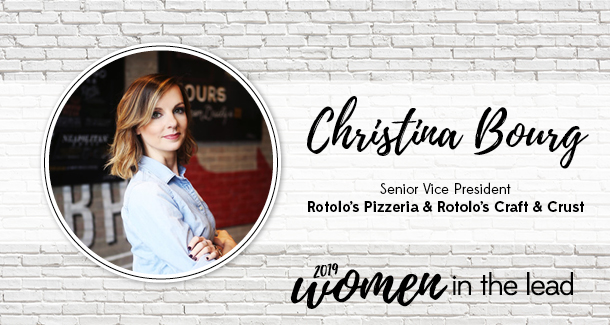
What was your first job in the restaurant industry?
This one! Unless working at the community ballpark selling nachos and hot dogs in high school counts.
It's no secret the restaurant industry has been slow to promote females to c-level executive roles, but that seems to be changing. Why do you more women are finally getting these positions?
For a long time, the operations side of the restaurant industry was male-dominated. That is changing. Women are no longer primarily seen as the support we are evolving into leaders.
If you weren't in the restaurant business, what would you be doing?
A contractor. Still may. The industry needs contractors who understand the unique needs of restaurants and the design aspect which is essential to attracting customers.
What have you learned about yourself during your tenure as a restaurant exec?
There is no secret to success. Restaurants who consistently do the basics well will thrive.
What is one thing you wish you would have known when you first started your career?
If you want to get things done, pick up the phone. Our owner taught me this. Do not wait on emails to fly back and forth, pick up the phone, get to the point, and get it done. It was a hard lesson for those of us who grew up on AIM and text.

What was your first job in the restaurant industry?
My official first job in the restaurant industry was as a hostess at Texas Road House. From a marketing standpoint, Salata Salad Kitchen was my first job in the restaurant industry. I started my career in the healthcare nonprofit sector with Livestrong and went on to work for MMI Agency in Houston, Texas. There I worked with multiple clients across a variety of verticals including healthcare nonprofits, consumer packaged goods, oil and gas, and property management. My combined experience working with Proctor and Gamble, MD Anderson Cancer Center and others, gave me the skillset to work in a dynamic, franchise system on the cusp of huge change.
It's no secret the restaurant industry has been slow to promote females to c-level executive roles, but that seems to be changing. Why do you think more women are finally getting these positions?
I see that change happening in the cultural narrative of the workplace across many industries, but it is particularly being felt in the industries notorious for slow growth of female leaders. I recently read an article that said only 23 percent of CEOs in the restaurant industry were women. Women and men are equally capable of being leaders and with diversity in leadership, you see more thoughtful strategy from the ground up.
I believe that with the rise of more women executives, media companies like girlboss and restaurant-specific initiatives like Women's Food Service Forum, women have been empowered to claim their seat at the table. I feel grateful to work at Salata where our owners recognized a strong female leader in Michelle, our new president, that paved a path for me to become the director of marketing at the age of 26. My goal would be to continue paving a path for women in the restaurant industry.
If you weren't in the restaurant business, what would you be doing?
I would be working in the cancer research/non-profit sector. Outside of work, I make it a priority to be as involved in that as much as possible because it is near and dear to my heart. I sit on Ronald McDonald House's Board of Young Professionals and I recently completed my first half marathon to benefit the Leukemia and Lymphoma Society. Additionally, I am a Texas 4000 for Cancer alumna, where I biked from Austin to Anchorage to raise money for cancer research. My team raised approximately $600,000 that went to cancer hospitals and research centers.
What have you learned about yourself during your tenure as a restaurant exec?
I have learned that passion goes a long way in your job performance. I joined the Salata team in January 2018 because I was so passionate for what the company stood for. Healthy concepts can so quickly be very exclusive to the mass majority, but Salata provides countless ways for our guests to eat healthy however they choose to define it. This resonated with me and that created a motivation to go above and beyond in everything I do there, which has ultimately paved the way to become a better leader and brand advocate. Having recently been promoted to Salata's director of marketing after a year of being in the digital marketing manager, I found that pursuing what you are passionate about will open so many doors.
What is one thing you wish you would have known when you first started your career?
Without a doubt, the difference between assertiveness and confrontation. So often at the beginning of my career, I was spoken over by someone else in the room or was hesitant to offer a differing opinion because it felt like a confrontation. I slowly learned that assertiveness and standing up for what you believe in is vastly different than confrontation if you approach it the right way. Starting my career, I would have never been capable of doing the things I did within a month of working at Salata. I held a meeting with the executive team to push a cloud-based POS system with up-to-date integrations, e-gift cards and an updated website because I knew that was the best direction for the brand. I would encourage anyone reading this to push themselves to be more assertive in the workplace. Even as a leader now, I truly value everyone's opinion so we can get to the best outcome for the brand, even if it is a differing opinion than my own.

What was your first job in the restaurant industry?
I grew up in Washington, Kansas, a very small town, and we had a little diner called Mom & Pops, and I worked there when I was 15 years old. I fell in love with the fast pace and interaction with people. I then decided to get a degree in Hotel & Restaurant management at Kansas State University and continued to work in restaurants throughout my career.
It's no secret the restaurant industry has been slow to promote females to c-level executive roles, but that seems to be changing. Why do you more women are finally getting these positions?
Women in leadership roles challenge the norm of us being "nurturing and gentle." We can be these things, but we do not have to be them all the time. As society changes and gender roles adapt, so does the workforce. Society as a whole is finally, slowly but surely, accepting that women can take leadership roles and still be great women. Assertive women have not been well liked. We are sometimes seen as harsh, aggressive or confrontational. With more women in the workforce, it is hard to keep that mentality. On our end, I think women are beginning to take more risks than before. At Coolgreens, I am able to be more driven than ever and I am not scared to push boundaries, be innovative or challenge ideas. While before I think women would hold back on asking for raises and promotions, now we seem to be more comfortable with saying, "I deserve more."
If you weren't in the restaurant business, what would you be doing?
I honestly do not know, I love being a part of the Coolgreens family and meeting new people every day. It is so rewarding to go through the day to day challenges that the restaurant space brings. If money was not an object I would have an event center for weddings or other parties out in the country in a big beautiful barn with cozy lodging and amazing food for my guests.
What have you learned about yourself during your tenure as a restaurant exec?
I have learned that I am adaptable to change and that feedback is truly the breakfast of champions. I have learned to always be open to growing and that you can not blame others for your mistakes or failures. It's important to take ownership and learn from mistakes to become a better leader and person. I never felt I was a risk taker but I have learned that there is "no growth in comfort" and sometimes the bigger the risk the bigger the reward.
What is one thing you wish you would have known when you first started your career?
That feedback is good. Feedback, whether good or bad, helps you become a stronger leader and a better person. Feedback is so important for developing your leaders and your team. I have learned that if you can not receive feedback without getting defensive you will struggle to grow as a person. Now I simply state "thank you for the feedback" and fix what I need to fix. Giving feedback to the company as a whole and speaking your mind is something I wish I did more of in the beginning of my career. 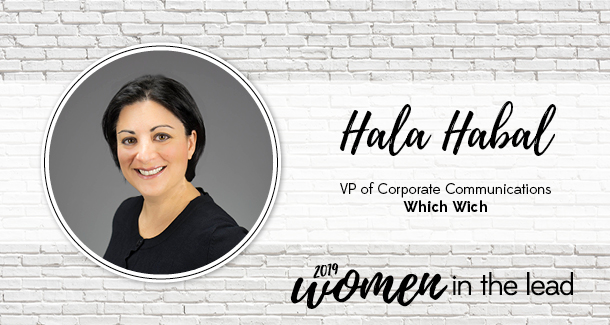
What was your first job in the restaurant industry?
My pathway has been unique in that my journalism career included writing extensively about the restaurant industry. So I received a rich education through interviewing hundreds of the top minds in the business. I wrote for several consumer and trade publications so I got to learn the ins-and-outs of the industry during my time as a journalist. I actually met Jeff Sinelli, the founder and CEO of Which Wich (and my boss), when I wrote a cover story on him. I believed in his vision and saw an incredible opportunity in helping him build the brand.
It's no secret the restaurant industry has been slow to promote females to c-level executive roles, but that seems to be changing. Why do you think more women are finally getting these positions?
Honestly, I wouldn't know about that through my experience at Which Wich. Half of our C-suite is made up of incredible female executives and since I joined the company, we have had very strong female representation at that level. We've created a culture in which women can thrive and there's purposeful attention to hiring and promoting based on merit.
That said, I do recognize that there has been a shift in the mindset of the industry recently. I know a lot of women who hold high-level positions at restaurant companies. I believe our society recognized that there were brilliant and dedicated women who deserved their place at the table and those companies that were first to reward them and put strong female leaders in positions to succeed reaped the benefits. This microcosm of Which Wich, at least, is a truly equal workplace, but from my vantage point the industry at large is certainly heading in the right direction.
If you weren't in the restaurant business, what would you be doing?
As I mentioned, I started my career as a journalist, and if Jeff Sinelli hadn't steered me out of that expected vocation, I would still be making my living by writing. I love that I still get to use those skills in my role at Which Wich today bringing to light the great human stories from within the brand.
What have you learned about yourself during your tenure as a restaurant exec?
You can be a successful, career-focused woman but also be a great mom and set a good example for your children. I have twin daughters and it's extremely important to me that I am a role model for what is possible in their future careers. I've learned that you are going to need to make hard decisions as an executive in the restaurant industry and have a lot of tough conversations that don't always win you fans, but is the right thing for the health and success of the brand. It's important to not just be present but to approach your role in a way where you're constantly looking for ways to positively impact the company.
What is one thing you wish you would have known when you first started your career?
I was in such a hurry to get out of school and racing to get into my career. It's funny, but at the time, you don't realize just how long your career will be. So, I wish I wouldn't have been going 100 mph into it and would have slowed down to enjoy the early part of the journey more. I can look back today and appreciate those early years and experiences — when maybe I wasn't allowing myself to at the time.
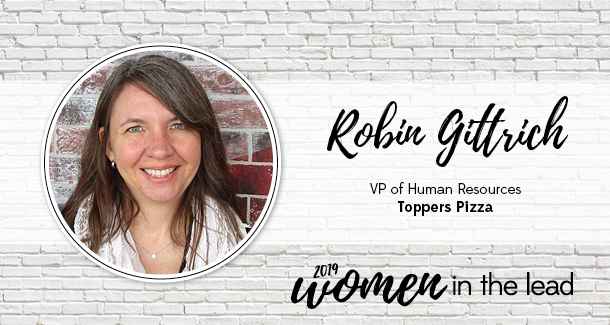
What was your first job in the restaurant industry?
My first job in the restaurant industry was working at Wendy's near my home as the salad bar girl on the weekends. I was 15 at the time, and before that, I'd only done the typical babysitting type of jobs. I remember walking the two miles to get there, and as I walked there, I found about 40 lucky pennies on the sidewalk. So, I just knew I was going to get the job. I walked in, asked to apply for a job, was interviewed and then hired on the spot. I worked several different jobs in the restaurant business after that including at Hardee's, Steak 'n' Shake and a Delco Pizza Hut.
I just love that the restaurant industry provides an opportunity for teenagers and young people to get a good first job and be able to work and make some money. I moved out of my parents' house as a teenager, so that job was important to start my career and provide me a paycheck to pay for rent and food. With the restaurant industry, you don't need to have already graduated high school, go to college or any other type of training. You can get your foot in the door while you're still in high school and create a really great career.
It's no secret the restaurant industry has been slow to promote females to c-level executive roles, but that seems to be changing. Why do you more women are finally getting these positions?
I think a part of it is a changing mindset in my generation and the ones following it where there are more career-oriented women who see the opportunity that exists today that may not have in the past. So, I think a lot of women are delaying having families some times but also have the flexibility to juggle a career with building a family. I don't think women in previous generations were able to do that in a lot of cases because of the culture of the time. Women should have the same opportunities as men to succeed while also being able to raise a family and I think that tide has changed in the last couple of decades.
When I was first in the restaurant industry as a teenager, it was very rare to see a female manager. Today, at Toppers Pizza, we aren't basing promotions off of gender — anyone who has the right character, does good work, and has the right leadership qualities can grow their career at Toppers. I think that's a mindset shared at many restaurant companies too.
The restaurant industry allows young women to get their foot in the door early without needing any specialized education. There's an even playing field for those who enter the restaurant business and have the right work ethic and ambition to move up in the industry.
If you weren't in the restaurant business, what would you be doing?
My major in school was art with a psychology minor. So, if I weren't in the restaurant industry, I would probably be doing something with art. It's still a passion of mine, but now I have become more of an admirer and collector of art than producing any even as a hobby.
What have you learned about yourself during your tenure as a restaurant exec?
Working within the restaurant industry has made me realize that I am a leader. I didn't always believe that when I was much younger but through my experience in the industry I'm now not afraid to speak my mind and take a stance on issues impacting the business. However, I've learned how to say things to people in a way that I'm able to be empathetic to their emotions but also be clear and get my point across.
I also used to get nervous about talking in front of groups. In fact, during a speech class in college, the teacher actually made accommodations for me to present without having to do it in front of the class because of my fear of public speaking. But over the years I've learned to actually love the opportunity to speak and present in front of groups. I'm the president of a local HR group and recently had to speak in front of a large group and it wasn't until afterward that I even thought about it. So, I've learned to be more fearless. I also don't worry as much about what other people think about me and I'm not going to compromise how I am if I feel passionate about an issue.
What is one thing you wish you would have known when you first started your career?
To toot my own horn. No one else is going to do it for you. It's important to be proud of the things you've achieved and stand up and take credit for the results of your hard work. When I do my one-on-ones with my team, I always ask them to write down their accomplishments since our last meeting so that we can focus on the great things that brought value to Toppers Pizza — no matter how small or how big. I like to focus on the positive contributions first, and then we can focus on, what I like to call "opportunities." Everyone is going to make mistakes, and you don't become an expert without making mistakes along the way. You need to take credit for your wins but learn from your stumbles.

What was your first job in the restaurant industry?
My first job in the restaurant industry was with AFC Enterprises as a Financial Business Planning Manager. It was a great starting point for me in the industry. At that time AFC Enterprises owned four restaurant concepts, which gave me the opportunity to learn about multiple brands and work with executive leaders from all four concepts.
It's no secret the restaurant industry has been slow to promote females to c-level executive roles, but that seems to be changing. Why do you more women are finally getting these positions?
Women bring different perspectives and talents to the workplace, especially with their ability to multi-task and take on new challenges. Over the past few years, many executive women have paved the way and have been great role models in the restaurant industry. A key role model for me was Cheryl Bachelder, the former Popeyes Louisiana Kitchen CEO. I learned a lot from her servant leadership approach and I was very fortunate to be mentored by her while I was at Popeyes.
If you weren't in the restaurant business, what would you be doing? The restaurant industry is an amazing industry which offers several career opportunities. Most of my experience in the industry has also been with brands that are highly franchised concepts. I really enjoy working with franchisees seeing their different viewpoints and their commitment in running a successful business. So, if I had to imagine being anywhere else, it would most likely be with another franchise concept.
What have you learned about yourself during your tenure as a restaurant exec?
I really enjoy learning and taking on new challenges. As my mother taught me at a very early age, you can do whatever you set your mind to. I have lived by that philosophy throughout my entire life and career; however, I have also learned I need to pace myself — It is not a race… It is a marathon!
What is one thing you wish you would have known when you first started your career?
Joining a brand is not just about the title, role or position. It is about the people you work with and finding a brand with the right culture fit.
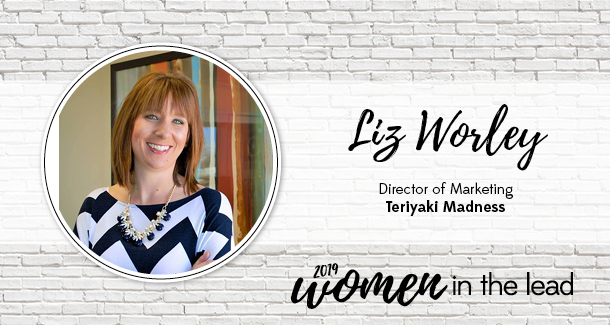
What was your first job in the restaurant industry?
Straight out of college, I was fortunate enough to work for a small agency in New Orleans, Louisiana, where I worked with several industries. One of those was a young restaurant brand, which had me hooked on the industry!
It's no secret the restaurant industry has been slow to promote females to c-level executive roles, but that seems to be changing. Why do you think more women are finally getting these positions?
Trends take time. So, as more women have been following a life path of pursuing higher education and having access to more opportunity, we've been validating that not only are we capable, but we complement the changing human resource trends. And honestly, we care intensely about all of the areas that we impact, which means we strive for excellence in all of them.
If you weren't in the restaurant business, what would you be doing?
I'd like to think that I'd be a small business owner like my father was. I've been watching small business owners grow with Teriyaki Madness and it's a modern act of bravery, from my perspective. There are trade-offs in life, so the drive for creativity and economic independence is offset by risk. I appreciate and admire those that take that leap even more now.
What have you learned about yourself during your tenure as a restaurant exec?
How resourceful I can be. I can look back on my early career to today and see that my ability to adapt and be quick on my feet with various situations is my biggest area of growth. And, let's face it, being a mom also helps me be ready for anything.
What is one thing you wish you would have known when you first started your career?
I am grateful that I was able to find a career that spoke to my passion so early on. And at that time, I had no idea I would be in this industry and loving it. So if I could pass on a nugget of wisdom, it would be to not settle if the position you start your professional life in doesn't excite you. Keep looking for what does, and chase after that.
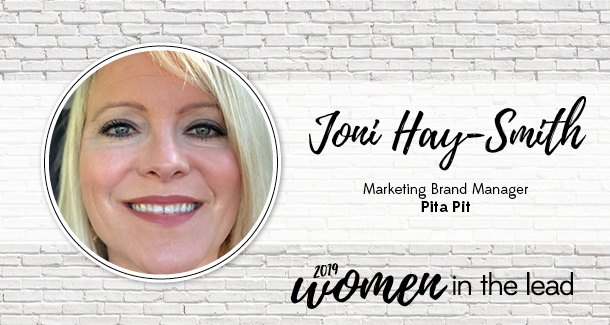
What was your first job in the restaurant industry?
My first job in the restaurant industry was at a small "mom and pop" restaurant. I started waitressing there the summer before my senior year in high school and continued working weekends and after sports practice during the school year. I continued my love for this business with an undergraduate major in Food Science and Human Nutrition and put myself through both an undergraduate degree and grad school by working in the hospitality business.
It's no secret the restaurant industry has been slow to promote females to c-level executive roles, but that seems to be changing. Why do you more women are finally getting these positions?
I believe we are seeing a shift in the leadership roles women are taking across all industries and I'm grateful to be a part of this changing environment. But, I feel strongly, unfortunately, that the glass ceiling still exists.
If you weren't in the restaurant business, what would you be doing?
I'm from a fifth generation farm family that raises wheat, barley, lentils, peas and chickpeas so I have an inherent passion for the farm to table movement, feeding the world and developing new sustainable food markets. My husband and I have been raising American Style Wagyu (Kobe) beef for local markets and restaurants since 2013, and we have also raised acres of quinoa and teff (which has an amazing full amino acid profile, no gluten and minimal production in the U.S.). To further my passion for the food industry, I would purse my Ph.D. and focus on how soil nutrients impact the micro-nutrients of our food and inevitably play a role in food sustainability and human health.
What have you learned about yourself during your tenure as a restaurant exec?
What I've learned from my experience in this industry, and specifically at Pita Pit, is that I'm a true extrovert who loves leading teams and working directly with guests. And, while I love developing strategic plans, I also love the fast pace, energy and constant change this industry offers!
What is one thing you wish you would have known when you first started your career?
This career has been a blessing and a journey so I'm not sure I would change anything. I've always trusted that I'm on the correct path and that doors will be closed if I needed to go in a new direction. I feel truly blessed by every experience and milestone.
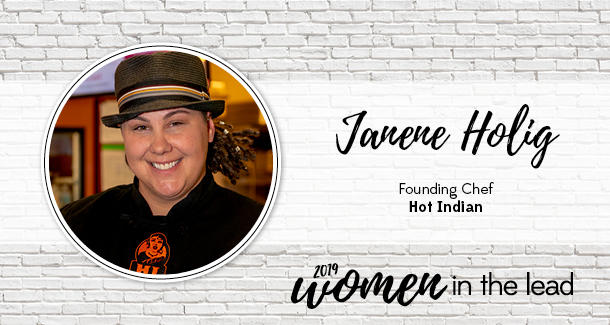
What was your first job in the restaurant industry?
My first "restaurant industry" job was when I was around 14 in the kitchen on my parent's bar and grill. Was it illegal at the time? Probably, but they knew they could count on me to show. It was in a small rural town in central Minnesota, and the bar was one of the only places near town serving food besides the morning cafe. I loved it! We served typical bar food with great burgers and pizzas. I was able to participate in product procurement and menu design which I found that I also had a passion for. Running specials and essentially making everyone in town lunch was challenging, rewarding and I enjoyed the compliments. I learned how to manage a rush from an early age and that I liked the challenge and pace of a kitchen.
It's no secret the restaurant industry has been slow to promote females to c-level executive roles, but that seems to be changing. Why do you more women are finally getting these positions?
I believe that women are finally getting exec positions because we work for and earn them. The entire gender climate is changing worldwide, and women are standing up and taking positions or creating businesses around their skills, determination and continued ideas. The stigma of women being lesser is clearly being proved false. The "boys club" in a kitchen is simply not sustainable, the locker room banter, the immaturity in communication, the childish tempers of macho chefs, that style is thankfully falling away. We can get much more accomplished in this industry by listening, coaching, and participating in our team's personal lives as well as their development goals. Who, typically, does these things better? Women.
We have a tendency to care a little more than some of our more archaic counterparts and that produces a stronger team and overall better performers. Women simply bring another perspective to the table that has been missing in the past. An executive team with diversity in all areas can better communicate, discuss and understand a greater percentage of the population. Strength in diverse numbers.
If you weren't in the restaurant business, what would you be doing?
If I wasn't in the restaurant industry I'm honestly not sure where I would be. I'm completely obsessed with food, the science of it, the culture attached to it, and I eat merely to get food off my mind until the next meal. Most of my hobbies include adventure sports and being on/in the water so maybe I'd be a scuba dive instructor somewhere. I enjoy problem-solving and fixing things so possibly something in a trade area like construction or electrician. I don't see myself in an office daily. I have always thought that my retirement would be spent as a florist.
What have you learned about yourself during your tenure as a restaurant exec?
I've learned that I have, and continue to gain, experience in this industry that can make a difference in our company. I am learning to be confident in my knowledge and to speak up with ideas and when I need help or clarification. I have high standards for our company and my team, higher than it seems most are used to when they come in, I am learning to manage my expectations and communicate standards clearly. I continue to learn more about myself and my leadership style as I transition from an exec chef to a VP role. I am currently working to gain better communication skills to be more concise and clear with my information.
What is one thing you wish you would have known when you first started your career?
I was too young at the time to know what I was doing would eventually be my career someday. I wish I would have known how demanding this career is. It's an immensely physical, mental, and time-consuming job. There is not always a formula to follow to handle most of the issues that arise daily so you need to be quick on your feet and confident to take action. Starting something is the hardest part, don't put your tasks off because you are afraid of failing at them. Sit down and start, when issues arise you will have more time to confront and fix them. Get organized! Seems obvious and easy but the more you advance the more "life" you will have to take on, being organized from the start will ease the transition. If you fail to plan, you plan to fail.

What was your first job in the restaurant industry?
My first restaurant job was as a hostess at a locally-owned Italian restaurant in Boston while in college. It was a new and popular place and I loved greeting people as they came in the door. Free delicious Italian food and fresh baked bread was a nice perk, too!
It's no secret the restaurant industry has been slow to promote females to c-level executive roles, but that seems to be changing. Why do you think more women are finally getting these positions?
The look of leadership in our industry is evolving and I believe this is due to the strong, intelligent and successful women who have blazed a path for so many to follow. I also credit the Women's Foodservice Forum for their 30 years of initiatives and research dedicated to advancing women leaders. I have been a member of WFF at pivotal times throughout my career and find the resources and access to personal development invaluable.
If you weren't in the restaurant business, what would you be doing?
I majored in hospitality management in college so I always knew that this was the industry for me. If I had chosen another path, it would have likely been as a career academic — either a professional student or professor — as I love the challenge of learning and sharing thoughts, theories, and insights with others.
What have you learned about yourself during your tenure as a restaurant exec?
I realized that the environment where I work matters — I pour a lot of myself into my work and it is far more rewarding to do that when surrounded by people you enjoy, admire and respect. I am very fortunate in that throughout my career I had the opportunity to work with a bunch of smart and fun people who are great at what they do.
What is one thing you wish you would have known when you first started your career?
In retrospect, I wish I had realized then how truly limitless the opportunities are within our industry. I learned along the way that there is room to grow in every role. When I stopped focusing on a set path, I actually started mapping my next steps without even realizing it.

What was your first job in the restaurant industry?
I started working at Biscuit Town at the age of 15 years old. It was a small business in the local mall. We served biscuits, of course, pizza and sandwiches. I loved talking with the mall walkers and shoppers and what female doesn't love to be in a mall.
It's no secret the restaurant industry has been slow to promote females to c-level executive roles, but that seems to be changing. Why do you more women are finally getting these positions?
Times have certainly changed, but I think it has taken some time for us as females to prove that we are able to balance home and the C-level position. This industry is tough, what I mean by that is the restaurant business is known for long days, with a 50 plus hours a week commitment and our busiest times are holidays and weekends. Women have evolved to show that they can do both, run a household and meet the demands from the restaurant industry. Even as an executive in a restaurant group you do not have a normal 9 - 5 role, or at least the more successful ones do not. Women have been able to show they are great in a multi-tasking role. Now I believe they have had to prove themselves in these roles, where men were able to advance very quickly, but I think it's all just part of the growth. I was fortunate, I grew up in the business world being comfortable around men, meaning I had the confidence to sit at table with them, work beside them in the restaurant and office. I can remember taking retreat trips early on and I was the only female there, but I was always respected and never felt out of place, this continued on for many years.
If you weren't in the restaurant business, what would you be doing?
I would still be doing something in the hospitality field. I love people and this field still lends itself to getting to know people's stories. Meeting different people, working with young adults and all the challenges this brings drives me. For most of our employees, this is a "stepping stone" job, so I love seeing where the young kids land later in life. I am a very outgoing person so this feeds my personality.
What have you learned about yourself during your tenure as a restaurant exec?
My love for the day to day feel of a restaurant is still my happy place. In our industry we usually have a lot of young adults entering as their 1st job so we get the opportunity to teach them good work ethic and help them develop great people skills, all of which have also evolved over the years. As an "executive" I have an even larger role in making sure we never forget our role as leaders is to teach the young adults skills they can carry on with to their "real jobs". I have a responsibility in seeing that we teach the management teams in our restaurants how to coach, encourage and support their employees. I have certainly learned that you must be flexible in all aspects. Today's millennial kids are just as good as our generation if not better, but you just have to reach them a different way. So our field must stay on top of trends and what makes people want to be a part of what you are inviting them to help you with. Stay flexible and open-minded to change.
What is one thing you wish you would have known when you first started your career?
That's a tough one to answer. I guess it is that I would love this as much as I do. I didn't finish college. I started off in nursing school, and was working in a restaurant to pay the bills. I very quickly fell in love with the industry and found out that leading people was something others thought I was pretty good at. So I ended up leaving school to pursue a management role, from there it continued to grow. My husband was working for a restaurant as well at the time. Something was attractive and different about this company, and at first, I could not figure it out, but I was being drawn to this company more and more. My husband was becoming someone different as well. He loved this company and it showed. His love for the company spread to me so I left where I was also and joined in. Not many can say they get to work with their spouse every day, but I do. And that's a whole other story!
The company that changed everything for us was formally known as Andy's, now known as Hwy 55 Burgers Shakes and Fries. This is where my heart and passion collided with the leadership skills I had started to develop. The founder of the company, Kenney Moore, taught me something that was a little foreign to me at the time. He shared his Servant Leadership philosophy with me. He opened up my eyes of how to truly lead people and not have a dictator's approach. Maybe without even realizing this, I felt that since I was a female in a "man's world" I had to be assertive and demanding, but that all changed when I begin working with Hwy 55. Sure, I made some mistakes and fell back into my old ways, but quickly found that trying to drive people by power was not the answer. I had to gain their respect through my actions and passion.
Early on we called it doing the intangibles, today we call it Servant Leadership. Regardless of the position, waiter or cook to the executive team, we teach, coach and live by being servant leaders and always look to love our neighbors. So maybe if I had known this earlier I could have handled some situations differently or maybe it all fell in place as it should have. Yes, I have an executive title, but the employees in this company of 125 plus locations know that if I or anyone else from the executive team walks into the store, we are here to help and if needed we can and will jump on the cook line or grill to help them out or take an order at the table and it never feels uncomfortable. Kenney has formed a company where it is the norm to work side by side with everyone, not above them. I am honored to work in this environment behind a desk or on a grill.
 ChatGPT
ChatGPT Grok
Grok Perplexity
Perplexity Claude
Claude

